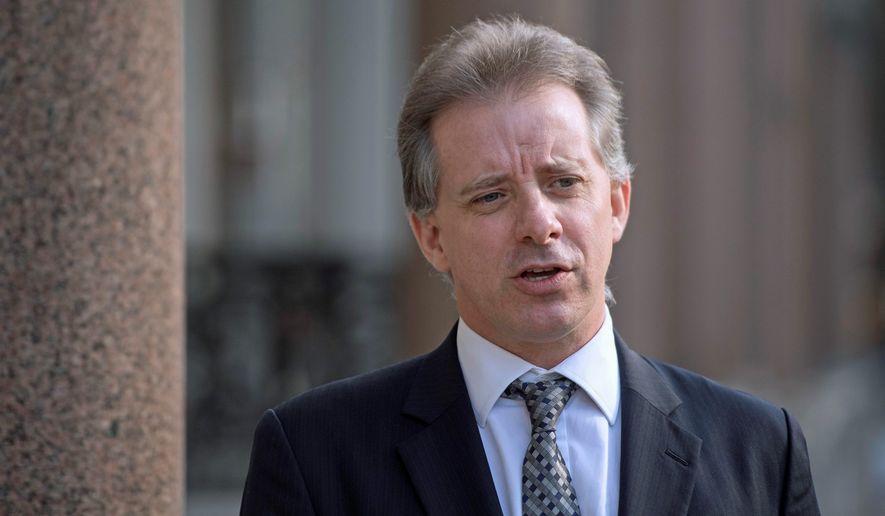The former British intelligence officer who wrote the notorious 35-page dossier saying candidate Donald Trump had long-standing connections to Russia insists his work is “70-90 percent accurate,” according to a book released Thursday.
Mr. Trump has repeatedly denied the dossier’s accusations, which have provided fuel for multiple congressional and federal investigations into Russian election meddling in the presidential election last year. The president has dismissed the document as “a pile of garbage” and branded it “fake news.”
Onetime MI6 agent Christopher Steele, however, says the multiple investigations should ultimately prove that much of his work was correct, according to “Collusion: Secret Meetings, Dirty Money, and How Russia Helped Donald Trump Win,” the book by reporter Luke Harding of the left-wing British newspaper The Guardian.
“I’ve been dealing with [Russia] for 30 years,” Mr. Steele, 53, is quoted as saying. “Why would I invent this stuff?”
Several leading media outlets refused to report on the 35-page dossier because they couldn’t verify the claims, which included compromising and salacious material that implied Mr. Trump had been blackmailed. But less than two weeks before Mr. Trump’s inauguration, the online news service BuzzFeed published the entire document.
Last month, Perkins Coie LLP, the law firm for the Democratic National Committee and Hillary Clinton’s 2016 presidential campaign, admitted its clients paid for the dossier, leading Mr. Trump to accuse Democrats of colluding with Russia against him.
Mr. Harding, the Moscow-based correspondent for The Guardian, met last year with Mr. Steele, who was posted in Russia in the early 1990s while employed by British intelligence.
In a statement, he said the Trump-Russia story is one of “follow the money.”
“The key to the Trump-Russia story is being able to follow the money, see what deals were made when and by whom, and what relationships were being cultivated and why,” Mr. Harding was quoted by The Associated Press as saying.
“Collusion” also investigates Trump confidantes and family members, including Donald Trump Jr., Jared Kushner and Paul Manafort, the former campaign manager indicted this month by special counsel Robert Mueller on charges including money laundering.
The dossier played a major role in the battle between Mr. Trump and FBI Director James B. Comey, who personally briefed Mr. Trump on the material just before BuzzFeed published it. Mr. Trump fired Mr. Comey in May, citing what he said was his frustration with the agency’s handling of the Russia collusion investigation.
Mr. Harding argues that Mr. Steele built a good reputation among elite U.S. law enforcement officials because of extensive work he did on Russia and Ukraine while investigating soccer’s international governing body FIFA.
The work was shared with the FBI and wound up as part of the Justice Department’s case against FIFA chief Sepp Blatter, whose 17-year reign over the governing body ended with a corruption scandal.
“The episode burnished Steele’s reputation inside the U.S. intelligence community and the FBI,” Mr. Harding wrote. “Here was a pro, a well-connected Brit, who understood Russian espionage and its subterranean tricks. Steele was regarded as credible.”
Mr. Steele is reported to have told friends he found the extent of collusion between Mr. Trump and Russia shocking and described the dossier of 16 reports that he compiled akin to a “radioactive hot potato.”
⦁ This article is based in part on wire service reports.
• Dan Boylan can be reached at dboylan@washingtontimes.com.




Please read our comment policy before commenting.